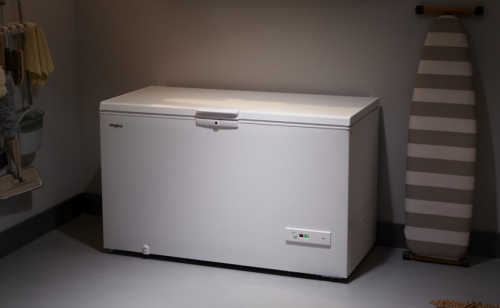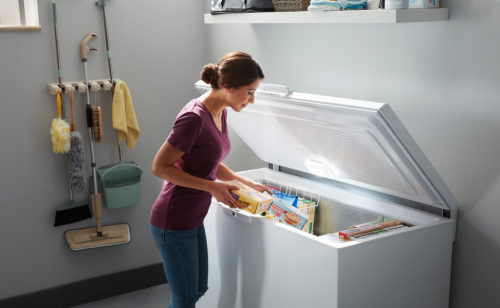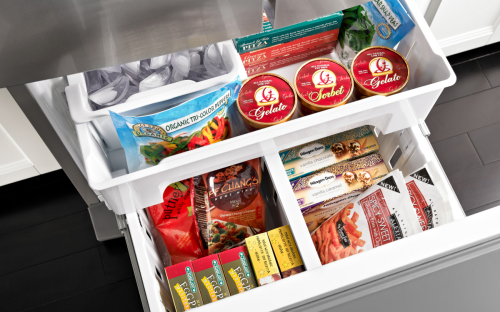
7 freezer problems & how to troubleshoot them
Whether you stock a standalone deep freezer or a fridge freezer combination, a freezer that stops working can lead to food spoilage that wastes money and interrupts your family’s daily routines. Keep reading to discover 7 potential causes of freezer issues and how to go about freezer troubleshooting, as well as how to reset a freezer and how to know if a replacement may be necessary.
Freezer problems and possible solutions
Keeping your freezer defrosted and at the proper temperature can help keep food fresh and extend the life of the freezer. Use the list below to learn about parts of a freezer that may malfunction and how to troubleshoot a freezer that’s not working. Always consult your use and care guide while troubleshooting and contact a professional if you need further assistance.

1. Leaking water
You may need to narrow down the cause of a leaking freezer by inspecting a handful of potential causes. First, check your icemaker to ensure that it’s producing and dispensing ice properly. Ice Makers with frost build-up can lead to leaking and need to be defrosted.
Next, a freezer or refrigerator not getting cold enough may be leaking due to frozen evaporator coils on the back freezer wall. The location of evaporator coils can vary slightly from model to model, so check your owners manual or consult a professional to learn more about checking coils for ice build-up. Lastly, the drain line that moves condensation from the freezer to the drain pan beneath the refrigerator may have a blockage. Consult your owner’s manual or a professional to learn how to access and clear the drain line.

2. Making strange noises
Most noises that you hear coming from your freezer are normal and not cause for concern. Freezers may hum or buzz as part of normal operation, but some freezer sounds, or abnormally loud sounds, may indicate an issue.
A freezer making unusually loud vibrating noises may not be level, and freezers with dirty condenser coils may operate more loudly or frequently as it works harder to cool. Your freezer might loudly click, buzz or hum if the evaporator fan is faulty. In this case, the freezer typically also struggles to stay cold. Learn more about how to troubleshoot a refrigerator that’s making noise.

3. Icing up
Thick frost build-up on freezer walls can block vents and coils, making it harder for your freezer to maintain its set temperature. This can happen when your freezer is too cold. You can defrost your freezer to help it function at its best, but some modern freezers, like the one in this refrigerator from Whirlpool brand, are equipped with Auto Defrost settings that help keep ice build-up at bay. Consider contacting a professional to look for underlying causes if your freezer is prone to rapid ice accumulation.

4. Compressor always running
A quick way to narrow down causes of a compressor always running is to check the freezer door gasket seal. If the seal appears worn or damaged, the compressor is likely working overtime to keep in the cold as cool air leaks out.
Defects with the freezer’s defrost timer and heater can lead to frost build-up that also causes the compressor to malfunction or work continually as the freezer can no longer cool properly. Contact a professional or refer to your owner’s manual to learn more about accessing and inspecting the defrost timer and heater. If they don’t appear damaged, check the freezer’s thermostat and control panel for damage and contact a professional if any is found.

5. Compressor won’t run
Your freezer’s compressor should routinely make a humming sound as it kick-starts the cooling process. If you suspect the compressor isn’t running, keep an ear out for your freezer’s sounds for at least 30 minutes. If you don’t notice humming noises during that time, there’s likely a problem with the compressor or various compressor components.
If your freezer’s thermostat, start relay, start capacitor or defrost timer is faulty, the compressor may not be cued or powered up to start cooling. Once you’ve checked each of these components, consider contacting a professional to inspect the compressor itself.

6. Door won’t seal
Your freezer’s door seal—called a gasket—helps keep warm air out and cold air inside. If your freezer won’t stay cold or the door won’t stay shut, the door gasket may have bends or small tears. Check the gasket by closing a piece of paper in the freezer door, then tug at the paper. The door gasket may be faulty if the paper comes loose with little resistance. Be sure to check the gasket around the entire freezer door perimeter to identify any openings.
Freezer door gaskets are generally simple to replace and may be available as a wrap-around piece of rubber. Older models could require you to unscrew the gasket to replace it.

7. Dirty coils
Freezer condenser coils transport refrigerant that helps absorb heat from inside the freezer cavity. A freezer can’t cool as effectively with dirty condenser coils, but cleaning them is typically as simple as vacuuming them with a crevice attachment. Be sure to reference your owner’s manual for specific information on cleaning condenser coils. Keep in mind that some chest and upright freezers have condenser coils that are enclosed in the walls of the unit and are inaccessible, so the coils can’t be cleaned.


Can a freezer stop working, but the fridge still works?
If your freezer stops cooling but the refrigerator compartment works, the freezer may have frost build-up or clogged venting preventing it from doing its job. Check the venting in the back of the freezer to make sure no items are resting against it, then examine the ice build-up inside the freezer.
If your freezer is frosted over, ice may be freezing against the evaporator coils and obstructing proper airflow in the freezer. A faulty defrost timer may also be the cause of a freezer that continually frosts over.


How do I reset my freezer?
Resetting your freezer may help remedy a handful of issues, and you can typically do it in a few simple steps. First, unplug the freezer or refrigerator-freezer combo from the wall, then shut off your freezer’s control panel by turning the controls to zero or using a shut-off switch (consult your owner’s manual for specific instructions). Wait a few minutes, then plug the freezer back in again and set the freezer’s temperature settings.
How long does it take a freezer to reset?
Walking through the steps of resetting a freezer should only take a few minutes, but it can take up to 24 hours for the freezer’s temperature to stabilize upon resetting. Freezers that were only briefly disconnected should reach the desired temperature sooner.
How do I know when to replace my freezer?
Many freezer issues are simple to troubleshoot and resolve, but some problems are best remedied by replacing the entire freezer. If you’re encountering issues in your freezer’s later years, it may be time to upgrade to a new model.
Explore Whirlpool® freezers and refrigerators
Whirlpool® chest freezers, upright freezers and refrigerator freezers deliver the consistent cold you need to keep your family’s favorites preserved. Select freezers feature the Fast Freeze option that drops the temperature quickly to help lock in freshness. Plus, models like this Whirlpool® side-by-side refrigerator have In-Door-Ice® Storage so you get an extra full shelf in the freezer.
Was this article helpful? Pass it on
Explore more from Whirlpool brand
-
 What Is a Deep Freezer Is a deep freezer different from a regular fridge freezer? Learn more about this separate appliance and what it can do for you and your family.
What Is a Deep Freezer Is a deep freezer different from a regular fridge freezer? Learn more about this separate appliance and what it can do for you and your family. -
 Freezer Burn: What Is It & How Can You Prevent It? What causes freezer burn? Learn more about this food storage issue and get tips that will help prevent freezer burn on meat, vegetables, ice cream and other foods.
Freezer Burn: What Is It & How Can You Prevent It? What causes freezer burn? Learn more about this food storage issue and get tips that will help prevent freezer burn on meat, vegetables, ice cream and other foods. -
 6 Tips For How to Organize Your Freezer Keeping your freezer organized can help you access your favorite foods faster. Learn how to organize a freezer with these organization ideas, tips and hacks.
6 Tips For How to Organize Your Freezer Keeping your freezer organized can help you access your favorite foods faster. Learn how to organize a freezer with these organization ideas, tips and hacks.


home heartbeat
Ready for more tips, home hacks and appliance guides?



